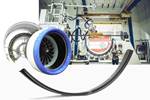Agreement provides framework for commercial aerospace tech research
RTX’s Collins Aerospace, Pratt & Whitney and TU Delft enhance collaboration on high-speed intelligent inspection systems to enhance composite materials development, hydrogen propulsion, industrial design and more.
Left to right: Menouer Boubekeur, director strategic development, applied research and technology, Collins Aerospace; Ray Foley, director advanced systems and demonstrators, applied research and technology, Collins Aerospace; Todd Spierling, principal Technical Fellow, electrification, power and controls, Collins Aerospace; Mary Lombardo, vice president engineering, Collins Aerospace; Henri Werij, dean faculty of aerospace engineering TU Delft; Mechteld van Beijeren, strategic partnership manager aerospace engineering TU Delft; Ingrid Houthuysen, strategic partnership manager aerospace engineering TU Delft; Michael Foley, associate director, sustainability office, Pratt & Whitney; Femke Verdegaal, strategic partnership manager aerospace engineering TU Delft. Source | RTX
Collins Aerospace (Charlotte, N.C., U.S.), Pratt & Whitney (East Hartford, Conn., U.S.) and Delft University of Technology (TU Delft, Netherlands) have signed a master research agreement (MRA) enabling bilateral collaboration across a range of sustainable aviation research opportunities, including advanced materials, hydrogen propulsion, advanced manufacturing and industrial design. Through the MRA’s strategic framework, Collins Aerospace and Pratt & Whitney will initiate multiple research projects involving TU Delft graduate research facilities, students and staff over the next 5 years. Collins Aerospace and Pratt & Whitney are RTX businesses.
“Collaboration between RTX engineers and university research institutions plays an important role in developing our understanding of emerging technologies, while also supporting the next generation of talent that will drive our industry forward,” says Michael Winter, RTX chief science officer. “Our MRA with TU Delft — our first agreement of its kind with a European university institution — will focus on advancing technologies to support more sustainable aviation, which is key to the future of our industry.”
Among the first projects initiated, Collins and TU Delft are collaborating on a high-speed intelligent inspection system to enhance manufacturing processes for lightweight and recyclable aircraft materials — RTX told CW that this will include state-of-the-art honeycomb structure materials and composites. Pratt & Whitney and TU Delft will develop novel engine configurations that use thermal energy recovery technologies in order to improve fuel efficiency and reduce CO2 emissions for commercial aircraft.
The new research agreement builds on long-standing engagement between Collins, Pratt & Whitney and TU Delft, including through European framework program such as Clean Aviation, under which Collins and TU Delft are part of the COCOLIH2T project, aimed at developing technologies for storing liquid hydrogen fuel on commercial aircraft. The companies sponsor TU Delft’s aerospace student association VSV Leonardo da Vinci and facilities, there is a close collaboration with the Aerospace Innovation Hub at TU Delft, as well as regular internship opportunities at Collins Aerospace’s aircraft interiors development facility in Houten, Netherlands.
Related Content
-
The potential for thermoplastic composite nacelles
Collins Aerospace draws on global team, decades of experience to demonstrate large, curved AFP and welded structures for the next generation of aircraft.
-
ASCEND program update: Designing next-gen, high-rate auto and aerospace composites
GKN Aerospace, McLaren Automotive and U.K.-based partners share goals and progress aiming at high-rate, Industry 4.0-enabled, sustainable materials and processes.
-
Infinite Composites: Type V tanks for space, hydrogen, automotive and more
After a decade of proving its linerless, weight-saving composite tanks with NASA and more than 30 aerospace companies, this CryoSphere pioneer is scaling for growth in commercial space and sustainable transportation on Earth.














